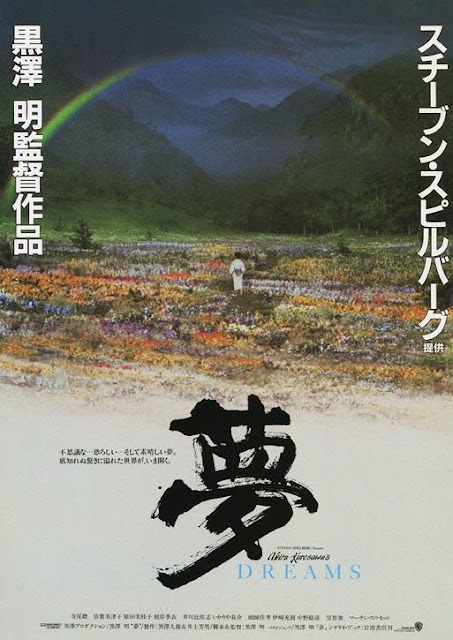Dreams (Film Review)

1990 Toho/Warner Bros.
Written and Directed by: Akira Kurosawa
Starring: Akira Terao, Martin Scorsese, Chishū Ryū, Mieko Harada, and Mitsuko Baisho
MPAA Rating: NR; Running Time: 119 Minutes
The Nicsperiment Score: 9/10
Dreams are transient, unconscious visions. You're lucky to realize you're in a dream while dreaming, let alone remember what you dreamed the next day. If you remember, good luck explaining it to anyone. People or objects in dreams often morph into different people or objects in the same dream. It's a wonder what it all means, though many people have tried to explain them. In 1990, legendary Japanese filmmaker, Akira Kurosawa, attempted to make waking visual sense of eight recurring dreams he claimed to have had throughout his lifetime. The result is the surrealistic, yet literally-titled film, Dreams.
Throughout Dreams, Kurosawa focuses on the perspective of a Kurosawa stand-in, the Dreamer. As each of the film's roughly 15-minute vignettes moves on to the next, the dreamer seems to increase in age. At the start, he's a curious boy, not heeding his mother's warnings to stay out of the forest during a sunshower. By the end, he's a wizened, middle-aged thinker. In his dreams between, he travels through a mystical peach orchard, a terrifying mountain blizzard, a haunted tunnel, and a post-apocalyptic landscape, among others.
Clearly, Dreams is the work of an aging master. After its creator's lifetime of black-and-white films, Dreams, like most of the small handful of color films Kurosawa lived to shoot, revels in eye-popping hues. Roy G Biv and every spectrum in between is blasted onto the screen--Dreams is truly a feast for the eyes. However, from a thematic and conversational level, Dreams is also the impatient work of a man who knows he only has so many chances left to speak. I don't know if Kurosawa's actual dreams often had as clear a, "Stop destroying the environment, you monsters!" throughline as his film Dreams, but boy is that throughline clearly running throughout these 120 minutes of cinema. Still, there's a sense of wisdom behind Kurosawa's blatant message. His preachiness reads more like an old guru assuring "all you need is love," than some stoned teenager blabbering on about the same topic--though Kurosawa's point here is, "Reliance on technology leads to ruin, and only a balance with nature and each other will lead to happiness." He also seems stubborn in some of his staging, as both a wedding and funeral procession go on uncut for minutes on end, as if he's telling his younger peers, "If you go through the trouble of putting this whole thing together, make sure your audience sees all of it!"
Still, an unfiltered work by an aging master is the work of a master, and few have been finer than Kurosawa. He may be at his most sentimental, nostalgic, and certainly unapologetically impassioned here, but its tough not to get swept away in his vision, even if it sometimes makes you drowsy enough to threaten that its title will soon become your reality.
For a more in-depth look at the film, check out Filmshake.


Comments